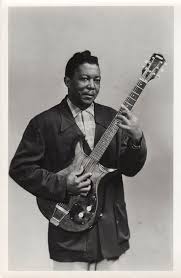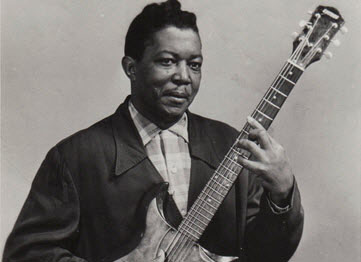Early Life and Musical Beginnings
Born Robert Lee McCollum on November 30, 1909, in Helena, Arkansas, Robert Nighthawk became one of the most influential figures in the development of electric blues. Raised in the Mississippi Delta, he was immersed in the region’s rich musical traditions from an early age. He learned to play guitar and harmonica, drawing inspiration from early blues greats like Charlie Patton and Son House.
Journey into the Blues Scene
During the 1930s, Nighthawk began performing across the South, often traveling as a street musician. He eventually took on the surname Nighthawk, possibly inspired by the song “Nighthawk Blues” by Sol Hoopi, or as a stage name reflecting his nocturnal performances. He played alongside Houston Stackhouse, another Delta bluesman, who helped him refine his guitar skills.
His breakthrough came when he moved to Memphis and recorded for Bluebird Records in 1937 under the name “Robert Lee McCoy.” His early recordings, including “Prowling Night-Hawk,” showcased his intricate slide guitar work and deep, expressive vocals.
Influence and Chicago Blues Scene
In the 1940s, Robert Nighthawk relocated to Chicago, where he helped shape the city’s emerging electric blues style. He switched from acoustic to electric guitar and developed a signature slide guitar technique that would influence later blues icons like Muddy Waters and Elmore James. His smooth yet powerful style set him apart from his contemporaries.
Nighthawk recorded for several labels, including Chess Records, United Records, and Aristocrat Records. His best-known songs from this era include “Sweet Black Angel”, “Crying Won’t Help You”, and “Anna Lee”. These recordings displayed his masterful slide guitar skills and soulful delivery, earning him a strong following among blues enthusiasts.
A Mysterious and Nomadic Life
Despite his success, Robert Nighthawk remained a wandering musician, often preferring the life of a traveling performer over commercial fame. He spent much of the 1950s and 1960s playing on the streets of Chicago’s Maxwell Street Market, a historic hub for blues musicians. He also continued to perform in small clubs and juke joints throughout the South.
Unlike many of his contemporaries, Nighthawk did not aggressively pursue a recording career, which contributed to his relatively lower mainstream recognition. However, his influence on later blues artists was undeniable. His fluid slide technique and deep blues expression resonated with musicians who followed in his footsteps.
Later Years and Legacy
By the late 1960s, Nighthawk experienced a brief revival when he was rediscovered by blues historians and recorded a live session for Delmark Records. However, his health began to decline, and he returned to Helena, Arkansas. He made occasional performances on KFFA radio’s “King Biscuit Time”, a legendary blues program, but his career never fully reignited.
Robert Nighthawk passed away on November 5, 1967, just shy of his 58th birthday. Despite his relative obscurity compared to some of his contemporaries, his impact on blues music remains profound. His slide guitar technique has inspired generations of musicians, and his recordings continue to be celebrated by blues aficionados worldwide.
Influence on Modern Blues
Nighthawk’s legacy lives on through the works of artists such as Muddy Waters, Earl Hooker, and The Rolling Stones, all of whom have cited him as an influence. His ability to blend Delta blues traditions with electric Chicago blues innovations helped bridge the gap between the rural and urban blues sounds.
In recent years, blues scholars and musicians have recognized Nighthawk’s contributions, with tributes in blues festivals, reissues of his recordings, and references in blues documentaries. His music remains an essential part of the blues tradition, and his name is honored among the great pioneers of the genre.
Conclusion
Robert Nighthawk may not have achieved widespread commercial fame during his lifetime, but his contributions to blues music are undeniable. A true itinerant bluesman, he stayed true to his roots and crafted a style that continues to inspire musicians today. His smooth slide guitar playing and deep blues expression cement his place as one of the unsung heroes of the blues.
His music, raw yet sophisticated, remains a testament to the enduring power of the blues, and his legacy continues to resonate with those who appreciate the rich history of this deeply influential genre.


Comments are closed